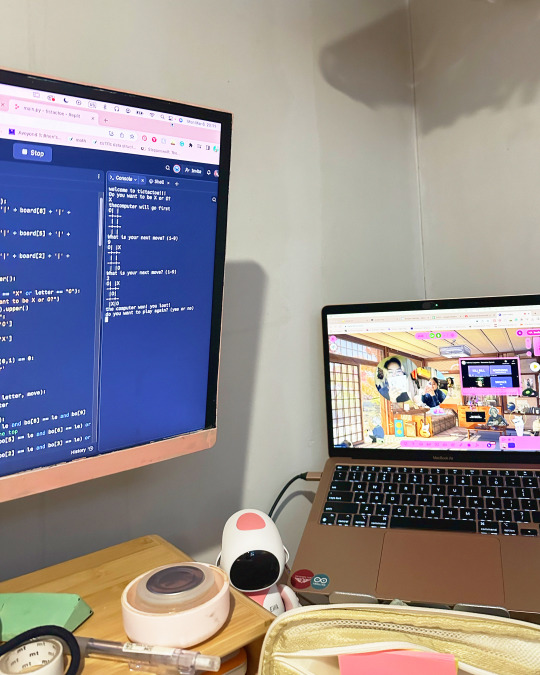#Data Structures and Algorithms
Explore tagged Tumblr posts
Text




current state of affairs
i just love how my room looks during warm weather... ☀️
#computer engineering#computer engineering major#comp sci#computer science#linux#japanese books#books#bookshelf#calculus#arduino#engineering#pythin#data structures and algorithms#studyblr#study motivation#room ideas#spring clean#spring vibes
120 notes
·
View notes
Text
(practicing dsa) is somebody gonna match my leet
#dsa#data structures and algorithms#leetcode#😀#recently i’ve just been spiraling on leet code#computer science
8 notes
·
View notes
Text
41/196
When your passion and purpose align, you won't be chasing your dreams - they'll be magnetically drawn to you. Focus, dedication, and clarity create an irresistible pull that attracts success.
-Your Ambition-lessness won't pay your bills, DSA will.

#data structures and algorithms#196series#dark academia#focus#consistency#dream#ambitious#dedication#passion#coding#spongebob#DSA
3 notes
·
View notes
Text
Unlocking Opportunities: Internships for CSE Students in Kolkata
The benefits of the LI-MAT Soft Solutions Internships for CSE students in Kolkata are many and varied. The most evident advantage may be obtaining experience in a natural working environment. Students considering a career in software development or a related industry may find this helpful.
Visit Us -
Facebook - https://www.facebook.com/people/Li-Mat-Soft-Solutions-Pvt-Ltd/100063951045722/
Instagram - https://www.instagram.com/limatsoftsolutions/
LinkedIn - https://in.linkedin.com/company/limatsoftsolutions
Twitter - https://twitter.com/solutions_limat
Phone - +91 879 948 8096
#Internships for CSE Students in Kolkata#Summer Training Internship in Kolkata#Summer Internship in Hyderabad#Summer Internship in Bangalore#Internships for CSE Students in Hyderabad#data structures and algorithms
0 notes
Text
How to Ace Your DSA Interview, Even If You're a Newbie
Are you aiming to crack DSA interviews and land your dream job as a software engineer or developer? Look no further! This comprehensive guide will provide you with all the necessary tips and insights to ace your DSA interviews. We'll explore the important DSA topics to study, share valuable preparation tips, and even introduce you to Tutort Academy DSA courses to help you get started on your journey. So let's dive in!

Why is DSA Important?
Before we delve into the specifics of DSA interviews, let's first understand why data structures and algorithms are crucial for software development. DSA plays a vital role in optimizing software components, enabling efficient data storage and processing.
From logging into your Facebook account to finding the shortest route on Google Maps, DSA is at work in various applications we use every day. Mastering DSA allows you to solve complex problems, optimize code performance, and design efficient software systems.
Important DSA Topics to Study
To excel in DSA interviews, it's essential to have a strong foundation in key topics. Here are some important DSA topics you should study:
1. Arrays and Strings
Arrays and strings are fundamental data structures in programming. Understanding array manipulation, string operations, and common algorithms like sorting and searching is crucial for solving coding problems.
2. Linked Lists
Linked lists are linear data structures that consist of nodes linked together. It's important to understand concepts like singly linked lists, doubly linked lists, and circular linked lists, as well as operations like insertion, deletion, and traversal.
3. Stacks and Queues
Stacks and queues are abstract data types that follow specific orderings. Mastering concepts like LIFO (Last In, First Out) for stacks and FIFO (First In, First Out) for queues is essential. Additionally, learn about their applications in real-life scenarios.
4. Trees and Binary Trees
Trees are hierarchical data structures with nodes connected by edges. Understanding binary trees, binary search trees, and traversal algorithms like preorder, inorder, and postorder is crucial. Additionally, explore advanced concepts like AVL trees and red-black trees.
5. Graphs
Graphs are non-linear data structures consisting of nodes (vertices) and edges. Familiarize yourself with graph representations, traversal algorithms like BFS (Breadth-First Search) and DFS (Depth-First Search), and graph algorithms such as Dijkstra's algorithm and Kruskal's algorithm.
6. Sorting and Searching Algorithms
Understanding various sorting algorithms like bubble sort, selection sort, insertion sort, merge sort, and quicksort is essential. Additionally, familiarize yourself with searching algorithms like linear search, binary search, and hash-based searching.
7. Dynamic Programming
Dynamic programming involves breaking down a complex problem into smaller overlapping subproblems and solving them individually. Mastering this technique allows you to solve optimization problems efficiently.
These are just a few of the important DSA topics to study. It's crucial to have a solid understanding of these concepts and their applications to perform well in DSA interviews.
Tips to Follow While Preparing for DSA Interviews
Preparing for DSA interviews can be challenging, but with the right approach, you can maximize your chances of success. Here are some tips to keep in mind:
1. Understand the Fundamentals
Before diving into complex algorithms, ensure you have a strong grasp of the fundamentals. Familiarize yourself with basic data structures, common algorithms, and time and space complexities.
2. Practice Regularly
Consistent practice is key to mastering DSA. Solve a wide range of coding problems, participate in coding challenges, and implement algorithms from scratch. Leverage online coding platforms like LeetCode, HackerRank to practice and improve your problem-solving skills.
3. Analyze and Optimize
After solving a problem, analyze your solution and look for areas of improvement. Optimize your code for better time and space complexities. This demonstrates your ability to write efficient and scalable code.
4. Collaborate and Learn from Others
Engage with the coding community, join study groups, and participate in online forums. Collaborating with others allows you to learn different approaches, gain insights, and improve your problem-solving skills.
5. Mock Interviews and Feedback
Simulate real interview scenarios by participating in mock interviews. Seek feedback from experienced professionals or mentors who can provide valuable insights into your strengths and areas for improvement.
Following these tips will help you build a solid foundation in DSA and boost your confidence for interviews.
Conclusion
Mastering DSA is crucial for acing coding interviews and securing your dream job as a software engineer or developer. By studying important DSA topics, following effective preparation tips, and leveraging Tutort Academy's DSA courses, you'll be well-equipped to tackle DSA interviews with confidence. Remember to practice regularly, seek feedback, and stay curious.
Good luck on your DSA journey!
#programming#tutortacademy#tutort#DSA#data structures#data structures and algorithms#algorithm#interview preparation#interview tips
0 notes
Text
Unlock the Power of Data Structures and Algorithms: A Journey from Beginner to Expert
In the age of data-driven decision-making and technological innovation, understanding data structures and algorithms is not just an advantage; it's a necessity. Our master course offers you the opportunity to unlock the power of these fundamental concepts, taking you from a beginner to an expert.
0 notes
Text

At HeyCoach, we distinguish ourselves as a technologically advanced interview tutoring corporation, specializing in equipping software professionals to secure coveted roles within industry-leading product-centric organizations. One of our standout offerings is the uniquely tailored Super 30 program - a robust initiative conceived with meticulous attention, encompassing every vital element of a tech interview. It features a comprehensive focus on areas such as Data Structures, Algorithms, and System Design, complemented with strategies for managing behavioral queries and supported by practice via engaging mock interview sessions. The flexibility of the program allows bespoke modifications suiting the distinct capabilities and areas that each engineer seeks to develop, ensuring they receive the most opportune and beneficial lessons
#Tech interview coaching#software engineering#top product-based companies#Data Structures and Algorithms#System Design#Mock interviews
0 notes
Text
FINALS OVER 🔥🔥🔥🔥
DSA NEXT SEM 🔥🔥🔥
#thank GOD i didnt take discrete and dsa together#discrete is already bad i would have totally committed crimes if i took data structures and algorithms too#but taking dsa with probabilistic systems analysis will not be fun#psa and dsa are going to go from friends to enemies with me. 500k words. slow burn.#zuri rambles#time to draw scarletella on a leash
7 notes
·
View notes
Text

#I have a class on data structures and algorithms this semester therefore I'm legally allowed to make dumb programming jokes#also I didn't plan to put this as a picture but the formatting in text looked shit on mobile#self ship#self shipping#self ship meme#comfort character#fictional other#f/o#self insert x canon#favourite character#self ship community#f/o community#memes#programming memes#coding memes#selniasoriginal
92 notes
·
View notes
Text
7 Growth Functions in Data Structures: Behind asymptotic notations
Top coders use these to calculate time complexity and space complexity of algorithms.
https://medium.com/competitive-programming-concepts/7-growth-functions-in-data-structures-behind-asymptotic-notations-0fe44330daef
#software#programming#code#data structures#algorithm#algo trading#datastructures#data#datascience#data analytics
2 notes
·
View notes
Text




focus...
#computer science#comp sci#computer engineering#ballet#ballet student#engineering#math#math major#university#college student#studyblr#high achiever#study motivation#engineering major#women in stem#stem student#stem major#annotated books#data structures#algorithms#code#codeblr
130 notes
·
View notes
Text
Normally I just post about movies but I'm a software engineer by trade so I've got opinions on programming too.
Apparently it's a month of code or something because my dash is filled with people trying to learn Python. And that's great, because Python is a good language with a lot of support and job opportunities. I've just got some scattered thoughts that I thought I'd write down.
Python abstracts a number of useful concepts. It makes it easier to use, but it also means that if you don't understand the concepts then things might go wrong in ways you didn't expect. Memory management and pointer logic is so damn annoying, but you need to understand them. I learned these concepts by learning C++, hopefully there's an easier way these days.
Data structures and algorithms are the bread and butter of any real work (and they're pretty much all that come up in interviews) and they're language agnostic. If you don't know how to traverse a linked list, how to use recursion, what a hash map is for, etc. then you don't really know how to program. You'll pretty much never need to implement any of them from scratch, but you should know when to use them; think of them like building blocks in a Lego set.
Learning a new language is a hell of a lot easier after your first one. Going from Python to Java is mostly just syntax differences. Even "harder" languages like C++ mostly just mean more boilerplate while doing the same things. Learning a new spoken language in is hard, but learning a new programming language is generally closer to learning some new slang or a new accent. Lists in Python are called Vectors in C++, just like how french fries are called chips in London. If you know all the underlying concepts that are common to most programming languages then it's not a huge jump to a new one, at least if you're only doing all the most common stuff. (You will get tripped up by some of the minor differences though. Popping an item off of a stack in Python returns the element, but in Java it returns nothing. You have to read it with Top first. Definitely had a program fail due to that issue).
The above is not true for new paradigms. Python, C++ and Java are all iterative languages. You move to something functional like Haskell and you need a completely different way of thinking. Javascript (not in any way related to Java) has callbacks and I still don't quite have a good handle on them. Hardware languages like VHDL are all synchronous; every line of code in a program runs at the same time! That's a new way of thinking.
Python is stereotyped as a scripting language good only for glue programming or prototypes. It's excellent at those, but I've worked at a number of (successful) startups that all were Python on the backend. Python is robust enough and fast enough to be used for basically anything at this point, except maybe for embedded programming. If you do need the fastest speed possible then you can still drop in some raw C++ for the places you need it (one place I worked at had one very important piece of code in C++ because even milliseconds mattered there, but everything else was Python). The speed differences between Python and C++ are so much smaller these days that you only need them at the scale of the really big companies. It makes sense for Google to use C++ (and they use their own version of it to boot), but any company with less than 100 engineers is probably better off with Python in almost all cases. Honestly thought the best programming language is the one you like, and the one that you're good at.
Design patterns mostly don't matter. They really were only created to make up for language failures of C++; in the original design patterns book 17 of the 23 patterns were just core features of other contemporary languages like LISP. C++ was just really popular while also being kinda bad, so they were necessary. I don't think I've ever once thought about consciously using a design pattern since even before I graduated. Object oriented design is mostly in the same place. You'll use classes because it's a useful way to structure things but multiple inheritance and polymorphism and all the other terms you've learned really don't come into play too often and when they do you use the simplest possible form of them. Code should be simple and easy to understand so make it as simple as possible. As far as inheritance the most I'm willing to do is to have a class with abstract functions (i.e. classes where some functions are empty but are expected to be filled out by the child class) but even then there are usually good alternatives to this.
Related to the above: simple is best. Simple is elegant. If you solve a problem with 4000 lines of code using a bunch of esoteric data structures and language quirks, but someone else did it in 10 then I'll pick the 10. On the other hand a one liner function that requires a lot of unpacking, like a Python function with a bunch of nested lambdas, might be easier to read if you split it up a bit more. Time to read and understand the code is the most important metric, more important than runtime or memory use. You can optimize for the other two later if you have to, but simple has to prevail for the first pass otherwise it's going to be hard for other people to understand. In fact, it'll be hard for you to understand too when you come back to it 3 months later without any context.
Note that I've cut a few things for simplicity. For example: VHDL doesn't quite require every line to run at the same time, but it's still a major paradigm of the language that isn't present in most other languages.
Ok that was a lot to read. I guess I have more to say about programming than I thought. But the core ideas are: Python is pretty good, other languages don't need to be scary, learn your data structures and algorithms and above all keep your code simple and clean.
#programming#python#software engineering#java#java programming#c++#javascript#haskell#VHDL#hardware programming#embedded programming#month of code#design patterns#common lisp#google#data structures#algorithms#hash table#recursion#array#lists#vectors#vector#list#arrays#object oriented programming#functional programming#iterative programming#callbacks
17 notes
·
View notes
Text
if ur gonna write a textbook with java in it maybe learn java naming conventions first
2 notes
·
View notes
Text
What Dijkstra's two-stack algorithm does to Left parenthesis of Infix expression is everyone does to me
.
.
.
IGNORE 🤡
7 notes
·
View notes
Text
Transform Your Summer with Kolkata’s Best Training Opportunities
Summer is the perfect time to acquire new skills, boost your resume, and make valuable connections. For students and professionals seeking opportunities in Kolkata, there’s no shortage of top-notch summer training Internships to explore. We’ll delve into the benefits of summer training and highlight some of the best options available in the city.
Visit Us -
Facebook - https://www.facebook.com/people/Li-Mat-Soft-Solutions-Pvt-Ltd/100063951045722/
Instagram - https://www.instagram.com/limatsoftsolutions/
LinkedIn - https://in.linkedin.com/company/limatsoftsolutions
Twitter - https://twitter.com/solutions_limat
Phone - +91 879 948 8096
#data structures and algorithms#Summer Training Internship in Kolkata#Internships for CSE Students in Hyderabad#Summer Internship in Bangalore#Summer Internship in Hyderabad
0 notes